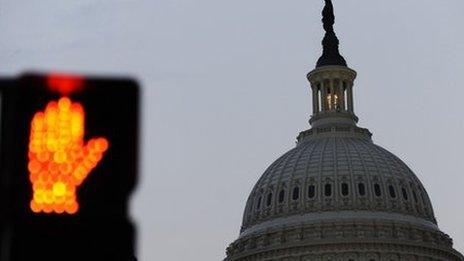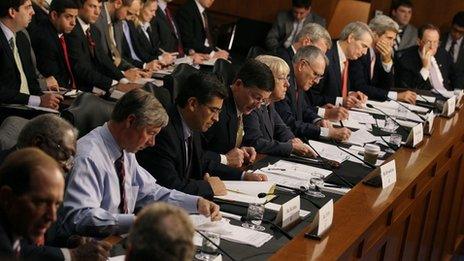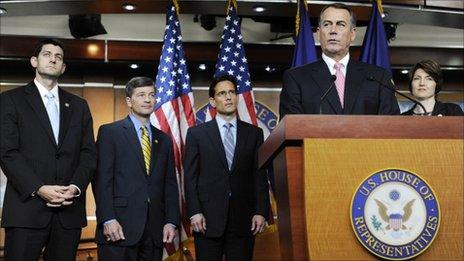Super-committee failure triggers blame game
- Published
- comments

President Barack Obama has said there will be "no easy off ramps"
The super-committee's failure to reach agreement on reducing the US deficit means we are now deep into the blame game, positioning for next year's presidential election.
President Barack Obama blames Republicans, hell-bent on protecting the richest American's at all costs.
Republicans blame him for a lack of leadership and the Democrats for an addiction to tax rises which will kill jobs.
Failure to agree will trigger savage cuts, in particular to the defence budget. That was the whole idea - that the alternative would be so bad they would have to reach agreement.
The White House intends to keep the pressure on Republicans, giving them the choice of - in many cases - breaking their promise to never put up taxes, or putting their country at risk.
The statement from Defence Secretary Leon Panetta, external, issued directly after the committee announced defeat, is meant to chill your blood and send shivers down your spine.
He warns the automatic cuts to his budget would "tear a seam in the nation's defense" and "lead to a hollow force incapable of sustaining the missions it is assigned".
Given this dire warning you might think he would be backing Republican congressman Buck McKenon, who says he will bring forward a bill, external to stop the automatic trigger and so prevent the "crippling" of America's military.
But no. President Obama has warned he will veto any such attempt.
"There will be no easy off-ramps on this one," he said.
"We need to keep the pressure up to compromise - not turn off the pressure.
"The only way these spending cuts will not take place is if Congress gets back to work and agrees on a balanced plan to reduce the deficit by at least $1.2tr."
Mr Panetta, of course, backs his president.
"I join the president in his call for Congress to avoid an easy way out of this crisis," he said.
"Congress cannot simply turn off the sequester mechanism, but instead must pass deficit reduction at least equal to the $1.2 trillion it was charged to pass under the Budget Control Act."
The White House may not have wanted failure, but it is well within their game plan.
At the moment they are quite happy that the political contest is Obama v Congress, not an actual Republican candidate.
All next year they will allow the idea to hang in the air, that Republicans would rather guard the rich against the disappearance of Bush-era tax breaks, than guard their country against attack.
The Republican nominee will be put on the spot about which he or she would prefer.
The president's ratings are not great. But the last survey suggested only 9% of Americans respected Congress.
President Obama will not be too unhappy if that is driven even lower, and a Republican candidate is tied to the decisions of his or her party in the House and Senate.
- Published22 November 2011

- Published6 August 2011

- Published13 November 2011

- Published10 August 2011
